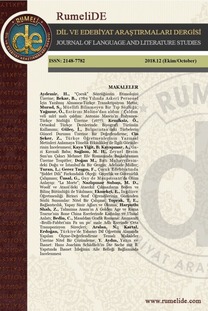Serbest çevirmenlerin Türkiye çeviri sektöründe yaşadığı zorluklar
serbest çevirmen, teknik çeviri, çeviri piyasası, Pierre Bourdieu, çeviri sosyolojisi
The ıssues freelance translators face on the Turkish translation market
freelance translator, technical translation, translation market, Pierre Bourdieu, sociology of translation,
___
- Ersoy, H., Odacıoğlu, M. C. (2014). Türkiye’de Serbest Çevirmenlerin Karşılaştıkları Sorunlar, Bu Sorunların Etkileri ve Öneriler. Turkish Studies, 9(6), 367-378.
- Fraser, J., Gold, M. (2001). ‘Portfolio Workers’: Autonomy and Control Amongs Freelance Translators. Work, Employment and Society. Sage Journals. https://doi.org/10.1177/095001701400438152
- Jänis, M. (1996). What Translators of Plays Think About Their Role. Target, 8(2), 341-364.
- Richard, J. 1992. Pierre Bourdieu. London: Routledge..............................
- Gold, M., Mustafa, M. (2013). Work always wins: client consolidation, time management and the anxieties of connected freelancers. New Technology, Work and Employment, 28(3), 197-211.
- Gotti, M., Sarcevic, S. (2006). Introduction. M. Gotti, S. Sarcevic (Eds.) Insights into Specialized Translation (s. 9-27). Bern: Peter Lang.
- Zetxsche, J. (2019). Freelance Translators’ Perspectives. M. O’hagan (ed.), The Routledge Handbook of Translation and Technology. (s. 166-182). London: Routledge.
- Baker M., Saldanha G. (eds.), Routledge Encyclopaedia of Translations Studies (2. bs). Routledge, USA, Canada, 2009.
- Bourdieu, P. (1993). Sociology in Question. (R. Nice, Çev.). London, England: Sage Publications. (1980).
- Bourdieu, P. (2015). Pratik Nedenler (2. bs). (H. U. Tanrıöver, Çev.). İstanbul: Hil Yayın. (1994).
- Bourdieu, P. (2016a). Seçilmiş Metinler (3. bs.). (L. Ünsaldı, Çev.). Ankara: Heretik. (1987).
- Bourdieu, P. (2016b). Akademik Aklın Eleştirisi Pascalca Düşünme Çabaları (2. bs). (P. B. Yalım, Çev.) İstanbul: Metis. (1997).
- Bourdieu, P., Wacquant, L. (2014). Düşünümsel Bir Antropoloji İçin Cevaplar. (N. Ökten, Çev.). İstanbul: İletişim Yayınları. (1992).
- Inghilleri, M. (2003). Habitus, Field and Discourse. Target, 15(2), 243-268...................................
- Inghilleri, M. (2005). The Sociology of Bourdieu and the Construction of the ‘Object’ in Translation and Interpreting. The Translator, 11(2): 125-145.
- Gouanvic, J. M. (2005). A Bourdieusian Theory of Translation, or the Coincidence of Practical Instances: Field, Habitus. Capital and Illusio. The Translator 11(2): 147-166.
- Heilbron, J. (1999). Towards a Sociology of Translation: Book Translation as a Cultural World-System. European Journal of Social Theory 2(4), 429–445.
- Lefevere, A. (1992).Translation, Rewriting and the Manipulation of Literary Fame. London and New York: Routledge.
- Myk ulusal meslek standardı. (2020,) Resmî Gazete (Sayı: 31129 (Mükerrer). https://portal.myk.gov.tr/index.php? option=com_meslek_std_taslak&view=taslak_listesi_yeni&msd=2 16 Mayıs, 2020
- Pietrzak, P., Kornacki, M. (2020). Using CAT Tools in Freelance Translations. New York: Routledge.
- Sela-Sheffy, R. (2005). How to Be a (Recognized) Translator: Rethinking Habitus, Norms, and the Field of Translation. Target. 17(1), 1-26.
- Sela-Seffy, R. (2011). Introduction. R. Sela-Sheffy, M. Shlesinger (Eds). Identity and the Status in the Translational Professions (s. 1-9). Amsterdam: John Benjamins.
- Setton, R. (2010). Conference Interpreting. Y. Gambier, L. V. Doorslaer (Eds). Handbook of Translation Studies (s. 66-75). vol. 1. Amsterdam/Philadelphia: John Benjamins Simeoni, D. (1998). The Pivotal Status of Translator’s Habitus. Target. 10(1), 1-39.
- Sofer, M. (2013). The Global Translator’s Handbook. New York: Taylor Trade.
- Szondy, M. (2016). Freelance Translators as Service Providers. I. Horvath (Ed). The Modern Translator and Interpreter (s. 29-45). Budapest: Eötvös University Press. Swartz, D. (2011). Kültür ve İktidar Pierre Bourdieu’nün Sosyolojisi. (E. Gen, Çev.). İstanbul: İletişim. (1997).
- Wolf, M. (2007). The Emergence of a Sociology of Translation. M. Wolf, A. Fukari, (Ed). Constructing a Sociology of Translation. (s.109-118). Amsterdam/Philadelphia: John Benjamins Publishing Company.
- Wolf, M. (2010). Sociology of Translation. Y. Gambier, L. V. Doorslaer (Eds). Handbook of Translation Studies (s.337-344) vol. 1. Amsterdam/Philadelphia: John Benjamins
- ISSN: 2148-7782
- Yayın Aralığı: 6
- Başlangıç: 2014
- Yayıncı: Yakup YILMAZ
Olcay ŞENER ERKIRTAY, Şeyda KINCAL
Teknik çeviri eğitiminde (öz)düşünümsel performanslar: Çeviri yorum yazıları
Murad KARADUMAN, Tuba LİVBERBER
Uluslararası öğrencilerin Türkiye’nin somut olmayan kültürel mirasına yönelik farkındalıkları
Toplumsal cinsiyet açısından Saç Adağı: Kara İyeleri kandırmak
Tatar yazar Galiesgar Kamal’ın İstanbul Mektupları adlı eserinde toplumsal hayat ve türk imgesi
Serbest çevirmenlerin Türkiye çeviri sektöründe yaşadığı zorluklar
Yabancılara Türkçe öğretimi alanında ek çalışma kâğıtları ile deyim öğretimi
